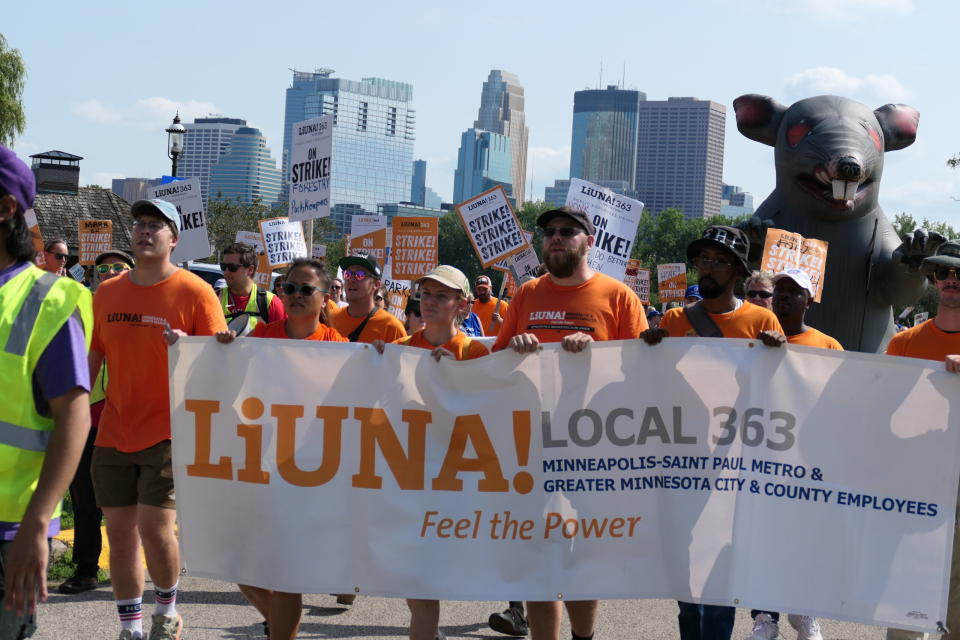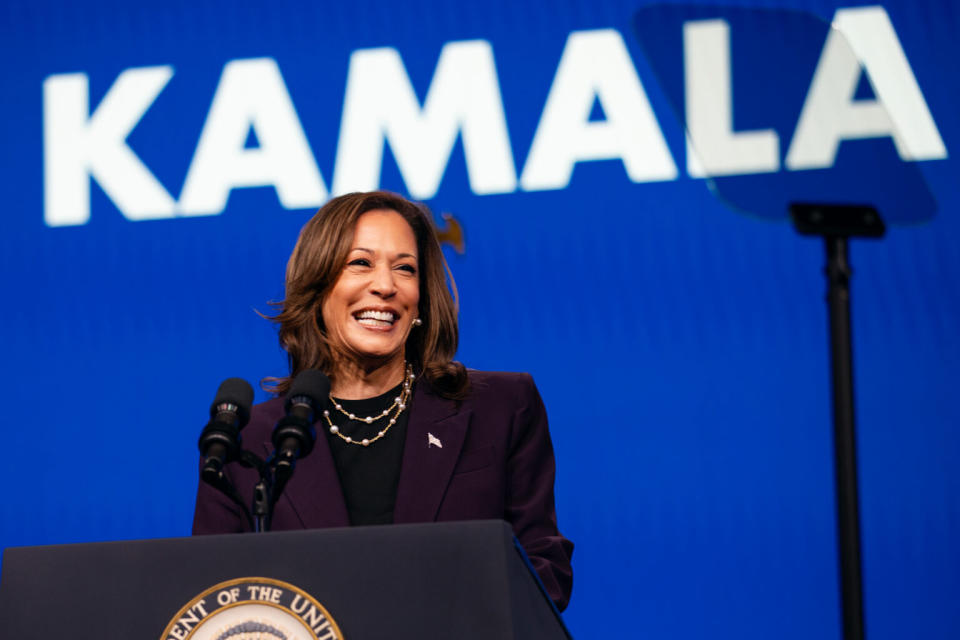Nurses union posts major gains in northern Minnesota — and other labor news

Photo courtesy of Essentia Health.
Take a seat in the Break Room, our weekly round-up of labor news in Minnesota and beyond. This week: Minnesota nurses union’s organizing blitz at Essentia; Minneapolis Park and Recreation Board reaches tentative agreement with striking workers; Medical staffing agency required to pay $336,000 to workers charged illegal fees; Unions line up behind Harris for president; and California Supreme Court ruling maintains ridehail drivers as independent contractors.
Minnesota Nurses Association unionizes more than 700 in 2024
A majority of more than 400 nurse practitioners, physician assistants and other advanced nursing staff voted to unionize across nine Essentia hospitals and 60 clinics spanning northern Minnesota and Wisconsin this week in the biggest victory for the Minnesota Nurses Association this year.
The union has gone on an organizing blitz of Essentia health care workers, unionizing nurses at the system’s big hospitals and smaller clinics across northern Minnesota and Wisconsin, including the Duluth 1st Street Clinic, 2nd Street Clinic, 3rd Street Clinic and Solvay Hospice House.
This year the union says it’s brought in more than 700 new members, most of them at Essentia facilities, adding to the more than 22,000 workers unionized with MNA.
“It’s really a response to the working conditions,” said MNA President Chris Rubesch, who is also a nurse at Essentia’s St. Mary’s Medical Center in Duluth.
Rubesch said Essentia’s “corporate health care” model focused on cutting costs and increasing productivity has burned out health care workers and compromised patient care.
“When you’re pressured to make more money and generate more revenue for the health system … you need to have a voice,” Rubesch said.
Soaring executive pay has also embittered workers. Essentia CEO David Herman’s pay increased 7% to $3.07 million in 2022, making him one of the highest paid health care executives in the state, while advanced practice providers say their pay has been stagnant in recent years.
Unionization among advanced providers like physician assistants and nurse practitioners is a new phenomenon that workers say is in direct response to consolidation in the health care industry. The Essentia advanced practice providers are the first professional providers to unionize at the health system, following doctors and other clinicians at Allina Health. Last fall, more than 550 clinicians across 60 Allina Health clinics formed the nation’s largest private-sector union of advanced care practitioners.
Following the vote tally on Tuesday, Essentia released a statement saying it was disappointed in the outcome and that it isn’t in the best interests of patients or staff for nurse practitioners, physician assistants, certified nurse midwives and clinical nurse specialists to unionize.
“A single bargaining unit that includes a wide range of settings, specialties and locations may not allow for unique approaches to caring for the different needs of patients,” Tonya Loken, Essentia’s community relations director, said in a statement.
Essentia continues to challenge the legality of the bargaining unit of the advanced practice providers, which delayed the election for months after workers filed a petition for an election last November.
The nonprofit health care system argues that workers cannot legally form a union across both acute-care hospitals and non-acute care clinics, even though the union says workers frequently work across both settings. Essentia also argues the bargaining unit can’t just include advanced practice providers without also including all other professional employees.
A regional director for the National Labor Relations Board, which oversees private sector unions, rejected Essentia’s arguments and allowed the election to proceed. On Thursday, Essentia filed a request for the NLRB to review the decision, saying there was a lack of precedent supporting it.
Minneapolis parks reached tentative agreement to end 3-week strike
The Minneapolis parks system and the union representing some 300 workers reached a tentative agreement in the early hours of Friday morning that will bring an end to a three-week long strike, the first in the park system’s 141-year history.
Details of the agreement must still be finalized before they’re released, a union spokesperson said.
The tentative deal comes after union workers shut down the Minneapolis Park and Recreation Board’s Wednesday meeting after the elected park leaders declined to intervene in negotiations between its administrative staff and the union.
A deal to end the strike seemed within grasp just days ago after the workers’ union accepted the park system’s last proposal on pay raises, clearing the table of budget concerns that had hung over negotiations.
What remained were new language proposals, which union leaders called “poison pilled.” They included making seniority “step increases,” which come with pay raises, contingent on satisfactory performance reviews and limiting the number of workers who can serve as union stewards, helping their colleagues file grievances and respond to disciplinary actions.
GrapeTree Medical Staffing pays workers back fees deemed illegal
Iowa-based GrapeTree Medical Staffing was required to pay approximately $336,000 in back wages and damages to 997 Minnesota workers after the Minnesota Department of Labor and Industry determined the agency illegally charged workers “booking fees” to sign up for shifts.
GrapeTree Medical Staffing employs health care workers to fill temporary assignments in understaffed nursing homes and assisted living facilities across 12 states. If employees missed a shift or canceled within 72 hours, the company deducted between $50 and $200 from their paychecks, according to a consent order with DLI the agency announced on Thursday.
The fees, which employees had to agree to in order to accept a shift, violated the Minnesota Payment of Wages Act and GrapeTree had to pay workers both the booking fees it deducted and an additional 85% of the fees in damages.
DLI audited the company’s records from July 12, 2020 to July 12, 2022, during the height of the pandemic when skilled health care workers faced a high risk of contracting COVID-19.
“Health care staff members worked tirelessly throughout the pandemic to ensure Minnesotans had access to much-needed medical attention,” DLI Commissioner Nicole Blissenbach said in a statement. “No one should have to give up their hard-earned wages to secure employment, including our most essential workers.”
The Illinois attorney general reached a $950,000 settlement with GrapeTree for charging workers fees in 2023.
GrapeTree CEO Steve Heeg said in an email that the company does not admit to violating the law but entered into the agreement with state regulators in order to resolve the case quickly. He also said GrapeTree has stopped charging booking fees to access shifts in the company’s portal.
Organized labor lines up behind Harris
Within hours of President Joe Biden withdrawing from the presidential race and endorsing Vice President Kamala Harris, the country’s largest labor unions began issuing full-throated endorsements of her candidacy. Endorsements rolled in from two dozen labor unions and organizations representing millions of workers, including the North American Building Trades Unions, Service Employees International Union, the United Food and Commercial Workers, the United Steelworkers, the Communications Workers Union and the National Education Association.
The endorsements are unsurprising given the Biden administration’s allegiance to organized labor. Biden, who calls himself “the most pro-union president in American history,” appointed worker advocates to the National Labor Relations Board, championed the massive infrastructure bill funding union construction jobs and advanced pro-worker policies like expanded overtime pay protections and a ban on noncompete agreements.
There are two major unions that are notably absent from Harris’ list of endorsements: the United Auto Workers and the Teamsters.
Biden became the first sitting president to visit a picket line during the United Auto Workers strike last fall and the union endorsed his bid for re-election. But the union did not rush to throw its support behind Harris, who herself walked a UAW picket line in 2019, although its ultimate endorsement of her seems likely.
Teamsters President Sean O’Brien has won both praise and criticism from his members for his overtures to Republicans. O’Brien spoke at the Republican National Convention, where he praised Ohio senator and Republican Vice President nominee J.D. Vance for “truly (caring) about working people” despite Vance’s opposition to pro-union legislation like the PRO Act. The speech was seen as a betrayal by the Biden administration, which bailed out the Teamsters pension fund over Republican opposition.
Organized labor also has the power to drive Harris’ pick for a running mate. This week, U.S. Sen. Mark Kelly of Arizona came out in support of the pro-union PRO Act after unions raised concerns about him as a potential vice president.
California Supreme Court rules in favor of gig-work platforms
In a major victory for Uber, Lyft and other gig-work platforms, the California Supreme Court upheld a state law that defines drivers as independent contractors rather than employees. In a unanimous decision on Thursday, the California high court said the law passed by voters — called Proposition 22 — was constitutional despite a challenge brought by SEIU California on behalf of four gig workers, Cal Matters reported.
The decision is the latest in a yearslong tug-of-war over the classification of ride-hail and delivery drivers, who as independent contractors are not entitled to labor protections afforded employees like overtime pay, workers’ compensation and unemployment insurance.
In 2019, California lawmakers passed a law known as Assembly Bill 5 that would have forced companies like Uber, Lyft and DoorDash to treat its workers as employees. The companies responded with a $200 million campaign to pass Prop. 22 through a ballot initiative exempting them from the law while providing workers with some benefits and protections. The measure passed with 58% support.
Minnesota’s new law setting minimum pay and labor standards for Uber and Lyft drivers is notably silent on whether drivers are independent contractors while allowing ride-hail companies to continue treating them as such.
The new pay rates in Minnesota take effect in December.



